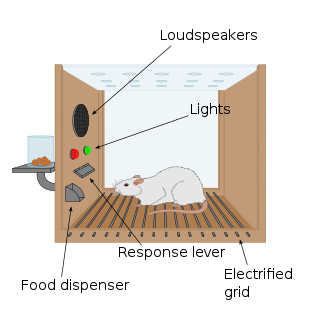Operant conditioning, also called instrumental conditioning, is a learning process where voluntary behaviors are modified by association with the addition of reward or aversive stimuli. The frequency or duration of the behavior may increase through reinforcement or decrease through punishment or extinction.

An operant conditioning chamber is a laboratory apparatus used to study animal behavior. The operant conditioning chamber was created by B. F. Skinner while he was a graduate student at Harvard University. The chamber can be used to study both operant conditioning and classical conditioning.

In behavioral psychology, reinforcement refers to consequences that increase the likelihood of an organism's future behavior, typically in the presence of a particular antecedent stimulus. For example, a rat can be trained to push a lever to receive food whenever a light is turned on. In this example, the light is the antecedent stimulus, the lever pushing is the operant behavior, and the food is the reinforcer. Likewise, a student that receives attention and praise when answering a teacher's question will be more likely to answer future questions in class. The teacher's question is the antecedent, the student's response is the behavior, and the praise and attention are the reinforcements.

Richard Julius Herrnstein was an American psychologist at Harvard University. He was an active researcher in animal learning in the Skinnerian tradition. Herrnstein was the Edgar Pierce Professor of Psychology until his death, and previously chaired the Harvard Department of Psychology for five years. With political scientist Charles Murray, he co-wrote The Bell Curve, a controversial 1994 book on human intelligence. He was one of the founders of the Society for Quantitative Analysis of Behavior.
Morgan's Canon, also known as Lloyd Morgan's Canon, Morgan's Canon of Interpretation or the principle or law of parsimony, is a fundamental precept of comparative (animal) psychology, coined by 19th-century British psychologist C. Lloyd Morgan. In its developed form it states that:
In no case is an animal activity to be interpreted in terms of higher psychological processes if it can be fairly interpreted in terms of processes which stand lower in the scale of psychological evolution and development.
Behaviorism is a systematic approach to understand the behavior of humans and other animals. It assumes that behavior is either a reflex evoked by the pairing of certain antecedent stimuli in the environment, or a consequence of that individual's history, including especially reinforcement and punishment contingencies, together with the individual's current motivational state and controlling stimuli. Although behaviorists generally accept the important role of heredity in determining behavior, they focus primarily on environmental events. The cognitive revolution of the late 20th century largely replaced behaviorism as an explanatory theory with cognitive psychology, which unlike behaviorism examines internal mental states.

Animal training is the act of teaching animals specific responses to specific conditions or stimuli. Training may be for purposes such as companionship, detection, protection, and entertainment. The type of training an animal receives will vary depending on the training method used, and the purpose for training the animal. For example, a seeing eye dog will be trained to achieve a different goal than a wild animal in a circus.
In operant conditioning, the matching law is a quantitative relationship that holds between the relative rates of response and the relative rates of reinforcement in concurrent schedules of reinforcement. For example, if two response alternatives A and B are offered to an organism, the ratio of response rates to A and B equals the ratio of reinforcements yielded by each response. This law applies fairly well when non-human subjects are exposed to concurrent variable interval schedules ; its applicability in other situations is less clear, depending on the assumptions made and the details of the experimental situation. The generality of applicability of the matching law is subject of current debate.
In psychology, a social trap is a conflict of interest or perverse incentive where individuals or a group of people act to obtain short-term individual gains, which in the long run leads to a loss for the group as a whole. Social traps are the cause of countless environmental issues, including overfishing, energy "brownout" and "blackout" power outages during periods of extreme temperatures, the overgrazing of cattle on the Sahelian Desert, the destruction of the rainforest by logging interests and agriculture, and, most importantly, climate change.
Vacuum activities are innate fixed action patterns (FAPs) of animal behaviour that are performed in the absence of a sign stimulus (releaser) that normally elicit them. This type of abnormal behaviour shows that a key stimulus is not always needed to produce an activity. Vacuum activities often take place when an animal is placed in captivity and is subjected to a lack of stimuli that would normally cause a FAP.

Dust bathing is an animal behavior characterized by rolling or moving around in dust, dry earth or sand, with the likely purpose of removing parasites from fur, feathers or skin. Dust bathing is a maintenance behavior performed by a wide range of mammalian and avian species. For some animals, dust baths are necessary to maintain healthy feathers, skin, or fur, similar to bathing in water or wallowing in mud. In some mammals, dust bathing may be a way of transmitting chemical signals to the ground which marks an individual's territory.
Nathan H. Azrin was a behavioral modification researcher, psychologist, and university professor. He taught at Southern Illinois University and was the research director of Anna State Hospital between 1958 and 1980. In 1980 he became a professor at Nova Southeastern University, and entered emeritus status at the university in 2010. Azrin was the founder of several research methodologies, including Token Economics, the Community Reinforcement Approach (CRA) on which the CRAFT model was based, Family Behavior Therapy, and habit reversal training. According to fellow psychologist Brian Iwata “Few people have made research contributions equaling Nate’s in either basic or applied behaviour analysis, and none have matched his contributions to both endeavors.”
Coaching psychology is a field of applied psychology that applies psychological theories and concepts to the practice of coaching. Its aim is to increase performance, self-actualization, achievement and well-being in individuals, teams and organisations by utilising evidence-based methods grounded in scientific research. Coaching psychology is influenced by theories in various psychological fields, such as humanistic psychology, positive psychology, learning theory and social psychology.

Clive D. L. Wynne is a British-Australian ethologist specializing in the behavior of dogs and their wild relatives. He has worked in the United States, Australia, and Europe, and is currently based at Arizona State University in Tempe, AZ. He was born and raised on the Isle of Wight, off the south coast of England, studied at University College London, and got his Ph.D. at Edinburgh University. He has studied the behavior of many species - ranging from pigeons to dunnarts, but starting around 2006 melded his childhood love of dogs with his professional training and now studies and teaches about the behavior of dogs and their wild relatives.

Priscilla M. Wehi is a New Zealand ethnobiologist and conservation biologist. As at July 2021 she is an associate professor at the University of Otago and on the first of that month officially undertook the role of director of Te Pūnaha Matatini, a centre of research excellence in complex systems and data analytics. During the COVID-19 pandemic in New Zealand Te Pūnaha Matatini scientists have developed mathematical models of the spread of the virus across the country that influence the New Zealand government's response to the outbreak. In 2021 Wehi was awarded the Hill Tinsley Medal.

Ngaio Jessica Beausoleil is a New Zealand academic, and is a full professor at Massey University, specialising in animal welfare and the cross-disciplinary field of conservation welfare.
Apaula Julia Ioane is a Samoan New Zealand clinical psychologist and academic, and is a full professor in the School of Psychology at Massey University, specialising in childhood trauma, family violence and youth offending.
Nickola Christine Overall is a New Zealand academic, and is a professor of psychology at the University of Auckland, specialising in relationship, family and couples psychology. She is especially interested in communication strategies to overcome conflict.
Maren Wellenreuther is a German–New Zealand marine scientist, and is a full professor at the University of Auckland, specialising in the development of indigenous fish aquaculture.
Bridgette Masters-Awatere is a New Zealand academic and practising psychologist, and is a full professor at the University of Waikato, specialising in Māori psychology and health.






